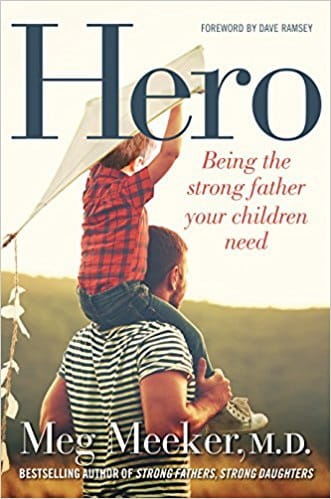How Fathers Can Parent with Courage and Truth

Courage and Truth
Doing what is right, true, and noble can be sticky business in a politically correct culture. I’m lucky because I don’t operate on political correctness; I do what medical science and clinical experience have taught me is best for kids. I have studied the needs of children for three decades and cared for thousands of them. I have been an eyewitness to what helps them and what harms them. And the things that help children always line up with what is right and true. And those things that harm children correspond to what is wrong and self-serving. Kids need dads who lead with moral courage.
I’m a great advocate of fathers, because I know how much you mean to your children. I know how courageous you can be, how self-sacrificing you can be, and also how often your role in the family is debunked or belittled in a culture that all too often has lost track of what is true.
When parents ask my advice on what movies or video games are acceptable, I usually say a variation of “father knows best,” because you do. Fathers have a natural instinct to want to protect their family. You know the movies your children should and shouldn’t see. You know how your fifteen-year-old daughter should dress when she goes to school or to the prom. You know how important it is to make family time a priority. So what prevents you from following your good fatherly instincts? It isn’t lack of courage, I know that. It isn’t lack of knowing what is right and what is wrong. Most likely it’s because you’ve been indoctrinated to think that it’s wrong to say no, that maybe father doesn’t know best, and that you have to bend with our fallen culture. Never believe such nonsense. You are the dad. You are the hero. Be courageous. Stand for right over wrong. Stand up for your family at all costs.
I know that can be hard, especially in matters of sex and morality, because the standards that we used to take for granted have been turned upside down. And they’ve been turned upside down not because we’ve suddenly learned, scientifically or clinically, that promiscuity and sexual “experimentation” is healthy—in fact, we know just the opposite to be true. It’s because there is an ongoing cultural war against traditional Judeo-Christian morality, and the anti-traditional morality forces are in the ascendant. I’ll leave it to historians and others to tell us why that is so, but it is so, and I see the often tragic results almost every day in my practice. When I started practicing medicine, we had two or three sexually transmitted diseases to worry about. Now we have more than thirty; it’s the least publicized epidemic in American medical history. It’s not publicized because it is aided and abetted by many of the leading public institutions and “health” programs of this country, which push contraception as the panacea that it isn’t and that encourage sexual activity and behavior that is, in fact, dangerous.
The culture might be going crazy, but you as a dad are not. You want your kids safe. You don’t want your daughters sleeping around with men or women at college and you certainly don’t want them assaulted. And when it comes to your sons, you want them to be strong, respectful, outstanding individuals because they are, after all, a reflection of you. You have a conscience; you have an interior sense of what is right and what is wrong, and I encourage you to use it. If you need a little help, here are a few guidelines that I’ve learned help kids. What is right:
1. It is right for children to speak and act respectfully to parents and other adults.
2. It is right for children to learn about your religious views and your faith in order to learn to worship God.
3. It is right for children to show respect to their siblings and peers.
4. It is right for children to expect their parents to provide for their basic needs.
5. It is right for children to learn to work hard and value hard work.
6. It is right for children to learn to live in community with others (at school for instance or in church groups or on sports teams).
7. It is right for children to understand that they fit into a family and that the family does not revolve around them.
8. It is right for children to think of their body as the temple of their soul—not something to be harmed or defaced.
9. It is right for children to play outside, breathing fresh air, running, swimming, and having fun.
10. It is right for children to dream, optimistically, about their future.
Conversely, there are a few things that I have come to see as wrong (or harmful) for children to do. What is wrong:
1. It is wrong for children to learn that being self-centered is good.
2. It is wrong for children to show frank disrespect to their parents or other adults.
3. It is wrong for children to willfully hurt others.
4. It is wrong for children to use foul language.
5. It is wrong for children to be sexually promiscuous.
6. It is wrong for children to be lazy.
7. It is wrong for children to cheat, lie, and steal.
8. It is wrong for children to look down on people because of their race or religion.
9. It is wrong for children to spend more time in front of an electronic device than in front of you.
10. It is wrong for kids to “experiment” with drugs.
11. It is wrong for kids to “experiment” with different sexual “identities.”
I have learned that when kids do what is on the “right” list they grow up to have strong character and to be responsible, hardworking adults. And when they follow the list of “wrongs,” I can almost guarantee that they are headed for some kind of trouble, whether physical, psychological, social, or economic. My list is not definitive. You and your wife can obviously make your own list. But set your standards and stand by them, because those standards are the guardrails of your children’s future.
The decisions you make when your children are two, three, five, or ten are extremely important. But don’t fall into the trap—as parents often do—of thinking that your teenagers don’t need you so much, given that they seem so grown up, and might even be taller than you. Actually, your teenage son needs you now more than ever. He needs to see that manliness is courage and quiet fortitude and not following the gang or getting drunk or smoking or sleeping with girls. And if you have a beautiful sixteen-year-old daughter, you need to be vigilant about vetting potential boyfriends. Let her know that they need to respect her as a woman; they need to keep their hands to themselves—and yes, she may appear to snub your advice, and even slam her bedroom door when you say she can’t date a certain boy. But good for you. Saying no takes a lot of courage and that’s exactly what your daughter needs—and will respect. I promise, your daughter will grow up in time to thank you and adore you. She will ultimately respect you because she will value your strength, guidance, and wisdom that kept her from making a wrong decision, maybe a seriously wrong one.

Image courtesy: ©Thinkstock/nd3000
Publication date: May 15, 2017
Originally published January 30, 2018.





